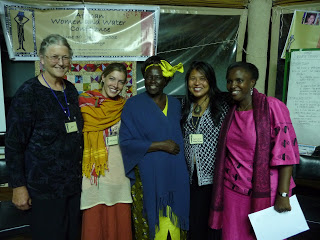GWWI Women and Water on Wednesdays: Celebrating GWWI Water Champions on International Women’s Day

GWWI Women &Water training 2008 with Nobel Laureate Wangari Maathai
Tomorrow is International Women’s Day and we here at the Global Women’s Water Initiative can’t imagine a better way to celebrate than to highlight the work of the GWWI grassroots teams and Fellows! It has been 9 months since the GWWI East African year long training program launched in July 2011 and since then fifteen water programs in three countries have spawned!
When the Global Women’s Water Initiative was first birthed in 2008 by Gemma Bulos, Jan Hartsough and Melinda Kramer and their respective organizations (A Single Drop, Crabgrass and Women’s Earth Alliance), we set out to find powerful grassroots women leaders and coordinate trainings to equip them with tools and skills to address one of the most pressing global issues of this century – access to clean water and sanitation. Since then we’ve met, learned from and shared with who we believe are some of the most inspirational women in Sub-Saharan Africa who are making significant contributions to their community. Many teams came to us with little or no experience in Water, Sanitation and Hygiene, but had missions that were focused on the empowerment of women tackling issues such as community health, environmental degradation, land rights and poverty.
The teams who applied and were selected to participate in our GWWI trainings knew that their programs to address these issues needed to be supplemented by women’s access to clean water and sanitation. As Kofi Annan stated
“The human right to water is indispensable for leading a healthy life in human dignity. It is a pre-requisite to the realization of all other human rights.” – Kofi Annan
Since 2008, GWWI has supported women who have never picked up a shovel in their lives and watched them transform into powerful WASH agents of change in their communities! Since then,
- 45 two-person Teams have participated in three GWWI training learning WASH Education and Technology Implementation
- GWWI teams have built technologies providing over 6000 people with improved access to clean water and/or sanitation and thousands more have benefitted from their WASH education seminars
- 1/3 of the programs are income-generating
- GWWI graduates have professionalized their services been hired as WASH Education facilitators and/or technology implementers
If you’ve been reading our blogs, you’ve read about Catherine Wanjohi and Susan Njeri Karaja of LifeBloom who uplift ex-commercial sex workers and create alternative livelihood programs for them. LifeBloom has integrated the WASH technologies and strategies they learned from GWWI as part of their vocational education. They have since been hired to install Biosand Filters into a women’s prison in Kenya. A hearty congratulations to Catherine who has since been accepted at Kenyatta University pursuing her PHD degree in Women and Development, specifically focusing on issues of the sex workers community in relation to development.
You’ve also met Rose Wamalwa, one of GWWIs African Fellows who has been our ear to the ground and an incredible support for the GWWI Kenya and Tanzania teams. She recently founded Women in Water and Natural Resource Conservation in Kenya and credits GWWIs mentorship as the impetus to start her own organization. And we offer her another heartfelt congratulations for Rose’s nomination as a Darwin Scholar to participate in the Monitoring and Communicating Biodiversity program hosted by the Field Studies Council in Oxford, UK.
We invite you to read more about all of the women who have come through our program! You can read about the teams from our blogs throughout the years.
Stay tuned in the coming weeks to meet more of the GWWI graduates and Fellows in our GWWI Women and Water on Wednesday series!
Like us on FB!
Follow us on Twitter!
We love to read your comments! Please let us know what you think 🙂
